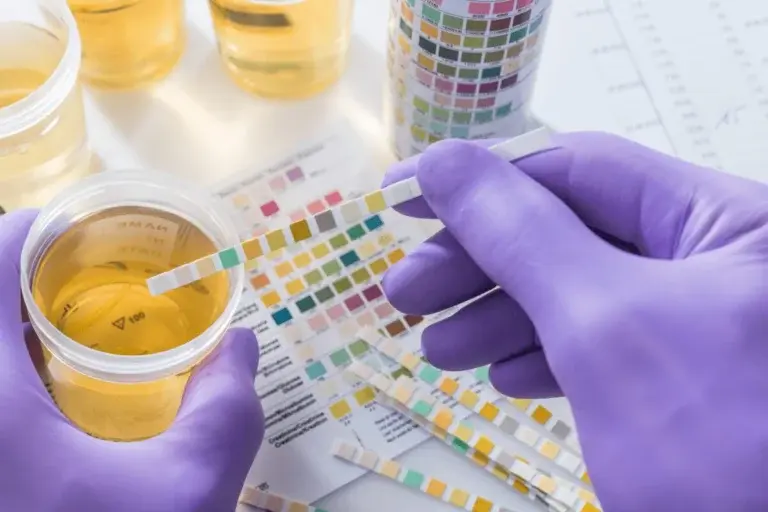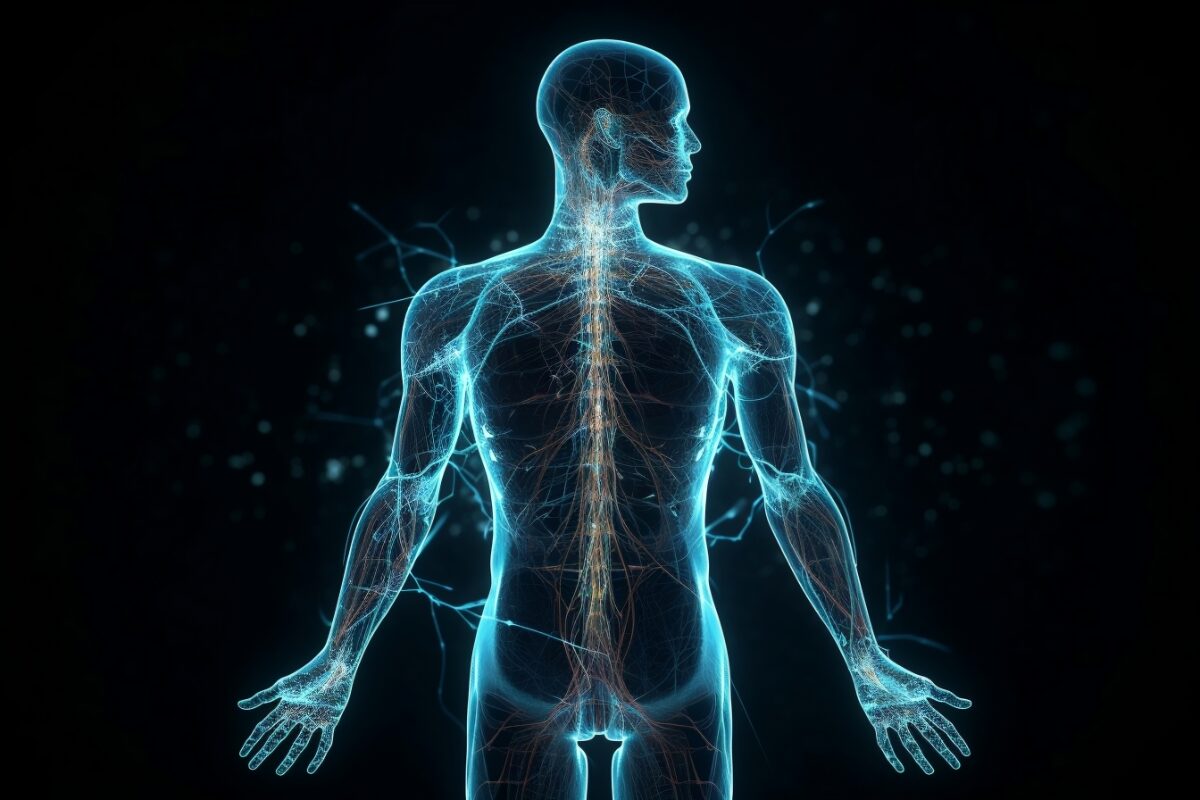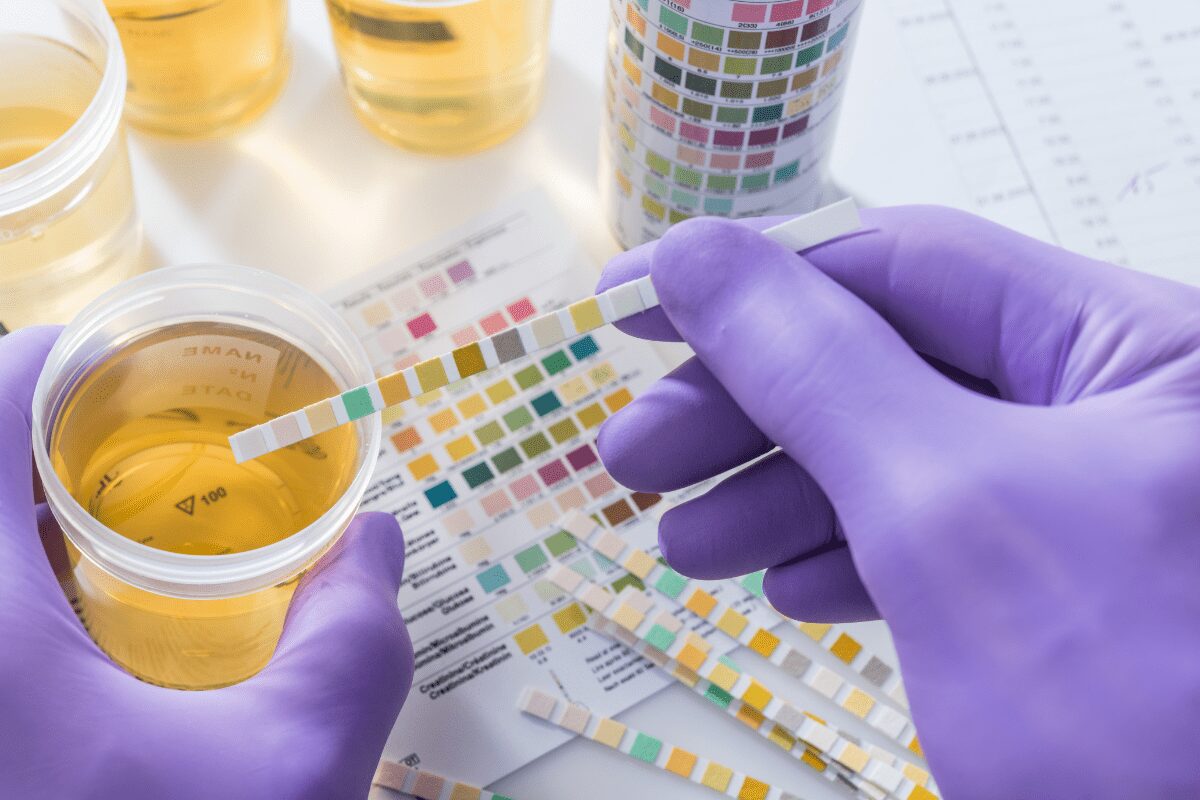
How Long Does Alcohol Stay in Urine?
Key Takeaways
- Alcohol can be detected in urine for up to 12 hours with standard tests and up to 80 hours with advanced EtG testing.
- Several factors influence detection time, including metabolism, hydration, liver function, and drinking habits.
- Urine tests are commonly used for workplace screenings, legal cases, and medical monitoring.
- Drinking water and allowing time for alcohol metabolism do not significantly speed up elimination, despite common myths.
If you or a love one are struggling with alcoholism, our alcohol rehab in Massachusetts can help. Call us now at 508-794-4400 or verify your insurance.
If you’ve ever wondered, how long does alcohol stay in urine?, you’re not alone. Whether you’re preparing for a drug test, concerned about the effects of alcohol, or simply curious about how your body processes it, understanding alcohol metabolism is crucial.
This article will answer the question, how long does alcohol stay in urine?, by explaining how the body processes alcohol, the detection windows for different tests, and the various factors that can affect how long alcohol remains detectable.
How the Body Metabolizes Alcohol
When you drink alcohol, your body breaks it down through a metabolic process. The liver plays the biggest role in this, using enzymes like:
- Alcohol dehydrogenase (ADH):Converts alcohol into acetaldehyde, a toxic byproduct.
- Aldehyde dehydrogenase (ALDH):Further breaks down acetaldehyde into acetic acid, which is eliminated as carbon dioxide and water.
Most alcohol is metabolized at a steady rate, around 0.015% BAC per hour. However, alcohol that hasn’t been metabolized circulates in the bloodstream and is excreted through urine, sweat, and breath.

Types of Urine Tests for Alcohol
Alcohol can be found in urine using any of the following test methods :
- Standard Urine Test
The most common type of urine test detects alcohol itself and typically identifies alcohol in urine for **up to 12 hours** after consumption.
- EtG (Ethyl Glucuronide) Test
The EtG test is much more sensitive. It detects ethyl glucuronide, a metabolite of ethanol, and can find traces of alcohol in urine for up to 80 hours(3-4 days). This test is often used in settings that require strict alcohol abstinence, such as probation or rehabilitation programs.
- EtS (Ethyl Sulfate) Test
The EtS test, like the EtG test, detects alcohol metabolites for up to 80 hours after drinking. It’s a reliable alternative to the EtG test and is sometimes used to confirm results.
Type of Urine Test | Detection Window |
Standard Urine Test | Up to 12 hours |
EtG Test | Up to 80 hours |
EtS Test | Up to 80 hours |
Factors That Affect Alcohol Detection in Urine
So, how long does alcohol stay in urine? The answer depends on several factors. Here are the key influences on detection time:
Amount and Frequency of Alcohol Consumption
- Heavy drinking or frequent alcohol consumption leads to longer detection times.
- A light drinker may have alcohol cleared from their system much quicker than someone who drinks heavily on a regular basis.
Metabolic Rate
- People with faster metabolisms tend to break down alcohol faster, reducing how long alcohol stays in urine.
- Younger individuals typically metabolize alcohol faster than older adults.
Hydration Levels
- Dehydration can concentrate alcohol in the urine, leading to it being detectable for longer.
- Drinking water won’t speed up alcohol elimination, though it may dilute the urine slightly, affecting test results.
Liver Health
- Healthy liver function aids in faster alcohol metabolism, while liver diseases like cirrhosis can slow down alcohol processing, increasing detection time.
Body Composition and Gender
- Women tend to process alcohol slower than men, primarily due to lower levels of alcohol-dehydrogenase and different fat-to-muscle ratios.
- Higher body fat percentage can slow alcohol metabolism, as alcohol is water-soluble and more alcohol is stored in fat cells.
Medications and Other Substances
- Some medications slow down alcohol metabolism, extending its presence in urine.
- Mixing alcohol with drugs can amplify its effects and increase the time it stays in your system.
Common Myths About Alcohol and Urine Tests
There are many misconceptions surrounding alcohol detection. Let’s debunk a few:
❌ Drinking lots of water will clear alcohol faster
✔ ️ Water dilutes urine but does not speed up metabolism. Your liver continues to process alcohol at the same rate.
❌ Exercising or sweating can eliminate alcohol faster
✔️ Only about 5% of alcohol leaves the body through sweat. Exercise might make you feel better but won’t speed up alcohol clearance.
❌ Drinking coffee sobers you up quickly
✔ ️ Caffeine doesn’t help remove alcohol. It may make you feel alert, but alcohol remains in your system.
Why Urine Alcohol Tests Are Used
Urine tests for alcohol are commonly used in various situations:
- Workplace Testing
Many employers require alcohol testing, especially for safety-sensitive jobs, such as driving or operating heavy machinery.
- Legal and DUI Cases
Courts, probation offices, and DUI cases may require alcohol testing to ensure compliance with sobriety orders or assess impairment.
- Medical and Addiction Treatment Programs
Healthcare professionals use urine alcohol tests in treatment programs or to assess the impact of alcohol consumption in clinical settings.
How to Reduce Alcohol Detection Time
While you can’t eliminate alcohol from your system instantly, you can support the natural process:
- Stay hydrated to prevent concentrated urine samples.
- Eat nutritious foods to support liver function and metabolism.
- Get plenty of rest, as sleep can assist your body in metabolizing alcohol more efficiently.
- Avoid excessive alcohol consumption if you expect a urine test.
However, no method is guaranteed to reduce detection time drastically—only time can truly eliminate alcohol from your system.

Find Help For Alcohol Today
When asking how long does alcohol stay in urine? It’s important to understand that it depends on various factors, including how much you drink, how fast your body metabolizes alcohol, and the type of test used. While standard urine tests detect alcohol for up to 12 hours, EtG and EtS tests can find alcohol traces for up to 80 hours.
If you have concerns about alcohol use or upcoming tests, it’s always best to drink responsibly and consult a healthcare professional for advice.
Call us today or visit our admissions page to learn more about our programs and start your path to lasting recovery.
